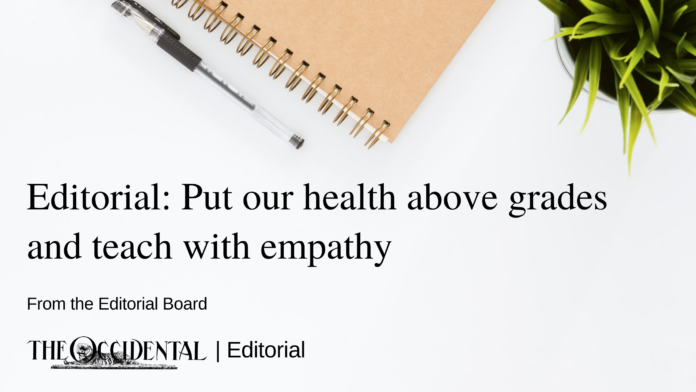Our 13-person editorial board is composed of students from a variety of majors who are currently scattered across the United States. Each of us has shared our feelings with one another: stress, frustration, apathy, anxiety, depression and fear. These aren’t unique to us — they’re felt by many Occidental students, as well as staff and faculty. We believe the burden of asking for academic accommodations should not fall on individual students. As a group of students struggling to balance class demands with life in a pandemic, we ask faculty to teach and grade with empathy.
Even before the coronavirus forced Occidental to transition to remote learning, Spring 2020 was difficult, with the sudden deaths of two students within a month of each other. The timing of the coronavirus so soon after the deaths of Ilah Richardson (first year) and Jaden Burris (sophomore) meant that students’ time to grieve together was cut short. Many of us are still processing everything we’ve lost. We cannot work and learn at our full potential.
To faculty, your students may never tell you this directly, but we are not paying attention. Most of us want to, but we can’t. Pandemic anxiety leaves us restless, forgetful, overwhelmed and lonely. More than 1 in 10 workers in the U.S. have lost their jobs — those workers are our family and friends, as they are yours. Despite our constant use of Zoom, FaceTime and BlueJeans, we have lost connections to peers and mentors. In some cases, we had no chance to say goodbye. We still value our education, but our priorities have shifted. Having the space and time to decompress, keep ourselves healthy and care for loved ones is essential to our well-being.
Faculty alone can reevaluate what it means to learn in the time of the coronavirus. Instead of focusing on deliverables for grades, professors should cut down on busywork and pare down assignment requirements. Assignments that may have taken students only 30 minutes to complete while on campus may now take them hours, with less information retained.
Our living situations are not equal, and coronavirus has made that clear. Students may not have access to basic resources, a quiet study space or reliable internet connection. Some are on the front lines, living in cities such as New York City that are now shut down and subject to an ever-increasing death toll. Others have family and friends who have fallen ill. International students may not be able to travel home for fear it would prevent them from returning in the fall. Being at home does not mean we have endless free time; it can mean increased family care responsibilities. We are not working from home; we are at home in a crisis trying to work — and it’s not working.
This semester cannot be salvaged. As much as we may crave a semblance of normalcy, nothing about this situation is normal. By assigning the standard minimum of 12 hours per week of schoolwork, substituting classroom learning for self-led instruction and scrambling to fit in remaining syllabus assignments, faculty are only bailing water out of a sinking ship that has hit an iceberg. As much as everyone is trying to keep the music playing, the ship is still sinking into perilous and unknown waters.
Professors can take punitive pressure off students and still offer positive learning opportunities. They can assign excerpts of their all-time favorite readings that got them through dark times in the past. They can reevaluate the parameters of final projects, instead of continuing to assign dense, 20-page research papers that require library access to complete. They can mix up instructional methods and replace 100 pages of screen-based reading with videos or podcasts. (Remember, without access to school printers, every book chapter on Foucault you assign is another 45 minutes students must spend hunched in front of a laptop.)
While it may not be possible to implement college-wide standards on assignment volume or grading, professors can work with departmental colleagues to space out deadlines and coordinate per-class limits on tests, papers and readings to make workloads manageable.
The syllabi we lived by before the pandemic were not designed for this learning environment. They were designed for students with 40 hours a week to dedicate to studying, with occasional but familiar stressors: roommate bickering, extracurriculars, being far from family. Now, everyone is operating on schedules shaped by factors outside of their control. Punitive point deductions on late assignments punish students for failing to manage time that is no longer theirs. Amending syllabi only minimally assumes that we are working under minimal changes to our lives.
Trying to cram a normal month’s volume of work into a month of a pandemic isn’t worth the added stress, lost sleep and anxiety. The relief provided to students by a professor’s empathy right now will last far beyond any subunit on macroeconomics or invertebrates.
It’s not enough to reassure students in the abstract to take care of themselves, or to tell them not to stress — faculty must use their power in modifying courses to give students tangible, immediate relief from extraneous demands that feel distant from our global reality. With the few weeks remaining in the semester, faculty should prioritize students’ mental and physical health and put empathy into practice.
![]()



































